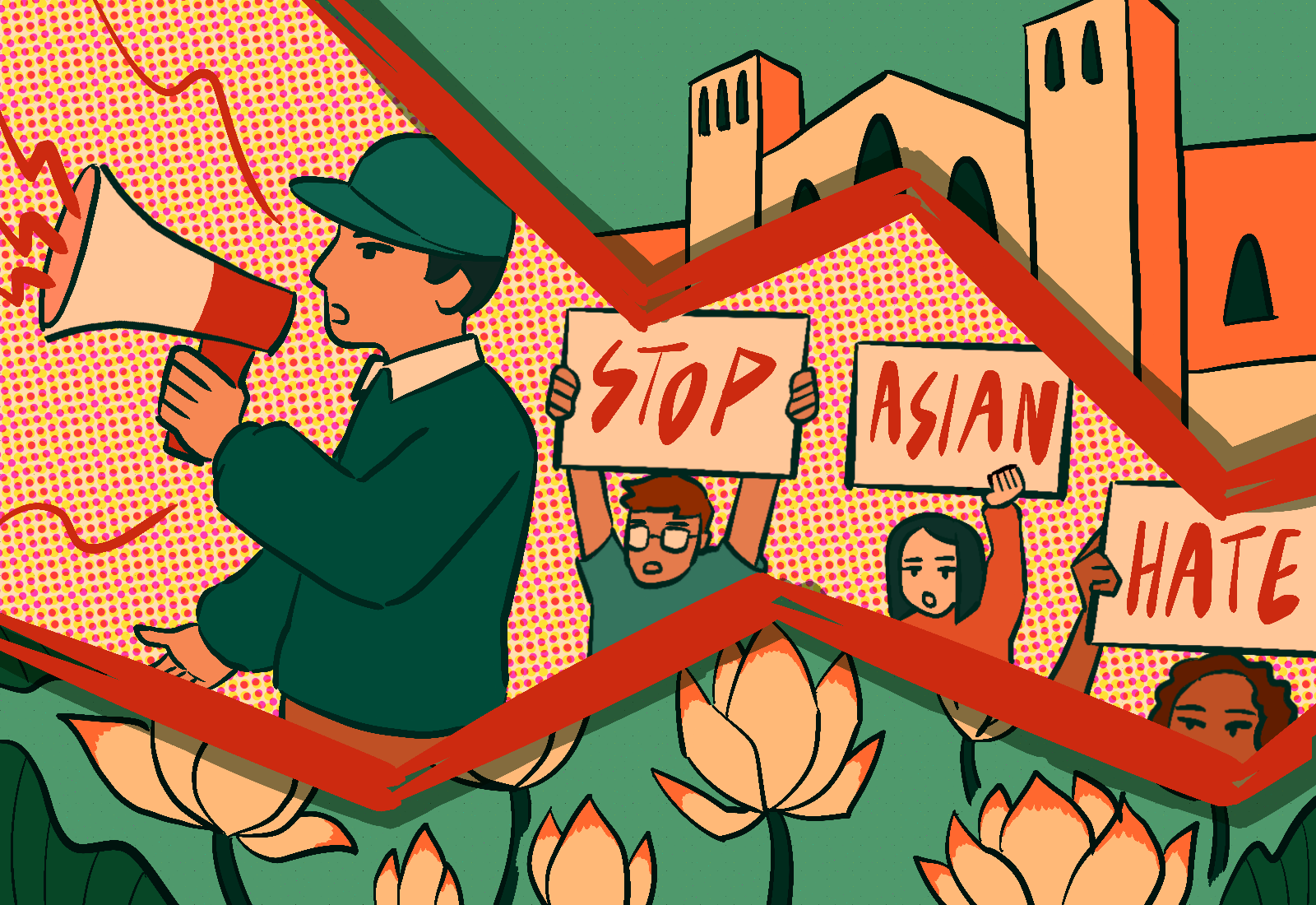Opinion: UCLA must support, protect Asian students amid worsening discrimination

(Isabella Lee/Daily Bruin)
By Allison Bushong
April 5, 2022 4:00 p.m.
This post was updated April 10 at 8:54 p.m.
At a university nationally praised for its leadership in social and progressive realms, passively reacting to the threat of racially motivated violence should not be allowed.
Unfortunately, that’s what happened in February.
Chancellor Gene Block sent a campuswide email Feb. 13 responding to a threat of a white supremacist rally on UCLA’s campus. A derogatory flyer containing significant discriminatory sentiment was issued four days earlier to the Asian American Studies Center. Though the university determined the rally did not present an immediate danger, UCLA’s reactionary response to such a threat reveals many shortcomings in the administration’s support for Asian populations on campus.
This includes the administration’s limited support for Asian students and Asian American and Pacific Islander faculty, among a number of things. Chancellor Block’s statement addressing an individual threat was not enough to make Asian students feel supported. UCLA administration needs to establish diversity in staff, increase funding for ethnic studies research and implement preventative, rather than reactionary, measures to better support Asian Bruins.
Maddie Ward, a second-year cognitive science student, said, as an Asian American student, she does not feel protected by UCLA’s administration.
“I definitely do feel like UCLA, in general, is bad at making students with unique identities feel valued on campus,” Ward said.
In recent years, hate crimes against Asian Americans have skyrocketed, in large part as a result of the COVID-19 pandemic. Anti-Asian hate has increased all over the country, but its presence in California is especially pertinent to campuses like UCLA, where 33% of the undergraduate student body identifies as AAPI.
Yaxuan Zheng, a fourth-year applied mathematics student, said the first step in combating Asian hate is to increase awareness. She added that education is the key to fostering unity and addressing prejudice.
“Not many people are aware of such hatred towards Asians given that California is especially a very diverse state compared to other states,” Zheng said.
In addition to increased awareness, an increase in staff diversity can make all the difference to students who come from underrepresented communities. Promoting representation in an otherwise white-dominated field such as teaching at UCLA is a necessary step. As of 2020, 24.1% of UCLA’s faculty were AAPI compared to the 55.7% of faculty who were white. While Asian Americans actually make up the majority of full-time equivalent faculty in certain departments, such as the School of Dentistry, they are severely underrepresented in many fields in the humanities and social sciences. For instance, only 9.4% of FTE faculty in the UCLA School of Law, 8.6% of FTE faculty in the School of Theater, Film and Television, and 8.7% of FTE faculty in the School of Arts and Architecture belonged to the AAPI community as of the 2018-2019 academic year.
UCLA has made significant progress in increasing diversity among faculty and staff, but there’s more to be done.
AASC director Karen Umemoto said ethnic studies research centers have seen a decline in FTE staff, but that increasing funding to their former levels can make UCLA stand out as a leader in ethnic research.
“UCLA is home to the largest concentration of faculty who do research and teaching on communities of color in the country, yet the support for ethnic studies research centers has waned over time,” Umemoto said.
Having diverse faculty across an institution’s departments can also facilitate better understanding and cooperation during a time like this, when anti-minority sentiments have spread. Microaggressions and discriminatory actions could also decrease.
Ward added that a lack of AAPI representation in positions of authority contributes to the disempowerment of AAPI students.
“It does prevent Asian voices from being heard in places where decisions are actually being made, but also, it prevents Asian students from thinking that they’re able to achieve these roles,” Ward said.
Zheng added that she feels her professors have done well in being inclusive in the smaller environment of their classrooms.
“I feel that in all my classes and everywhere I go, UCLA has stressed that no discrimination is tolerated based on either race, gender, or background and ethnicity,” Zheng said. “From my personal experience, I haven’t experienced discrimination of sorts, but I don’t represent everyone.”
This experience does indicate UCLA can be a safe space for students, but there is still much to be done to stomp out anti-Asian prejudice altogether. The administration’s response to threats that put underrepresented communities at risk must not remain passive and reactive but rather should promote larger conversations about how the university can support such communities in the long term.
Amid ongoing threats of racial violence, UCLA must strengthen its support for Asian students and faculty. Doing so will help AAPI students feel valued, supported and respected by administrators.


